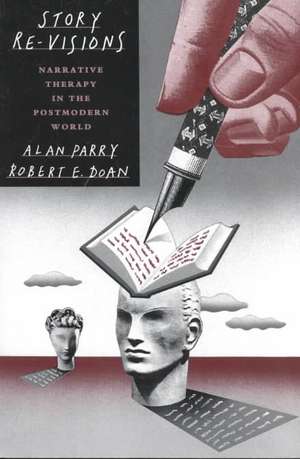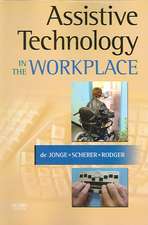Story Re-Visions: Narrative Therapy in the Postmodern World
Autor Alan Parry, Robert E. Doanen Limba Engleză Paperback – 30 noi 1994
Once upon a time, everything was understood through stories....The philosopher Friedrich Nietzsche once said that 'if we possess our why of life we can put up with almost any how.'...Stories always dealt with the `why' questions. The answers they gave did not have to be literally true; they only had to satisfy people's curiosity by providing an answer, less for the mind than for the soul. --From Chapter 1
Each of us has a story to tell that is uniquely personal and profoundly meaningful. The goal of the modern therapist is to help clients probe deeply enough to find their own voice, describe their experiences, and create a narrative in which a life story takes shape and makes sense. Emphasizing the vital connections among personal experience, family, and community, the authors of this provocative new book explore the role of narrative therapy within the context of a postmodern culture. They employ the interactional dynamics of family therapy to demonstrate how to help people deconstruct oppressive and debilitating perspectives, replace them with liberating and legitimizing stories, and develop a framework of meaning and direction for more intentional, more fulfilling lives. Blending scientific theory with literary aesthetics, Story Re-Visions presents a comprehensive collection of specific narrative therapy techniques, inventions, interviewing guidelines, and therapeutic questions.
The book examines the development of the postmodern phenomenon, tracing its evolution across time and disciplines. It discusses paradigmatic traditions, the meaning of modernism, and the ways in which the ancient, binding narratives have lost their power to inspire uncritical assent. Methods for doing narrative therapy in a destoried world are presented, with suggestions for meeting the challenges of postmodern value systems and ethical dilemmas.
Numerous case examples and dialogues illustrate ways to help people become authors of their own stories, and each of the last four chapters concludes with an appendix that provides additional information for the practicing clinician. Detailing ways in which a narrative framework enhances family therapy, the authors describe how the therapist and client may act together as revisionary editors, and present techniques for keeping the story re-vision alive, well, and in charge. Finally, the book examines re-vision techniques for clinical training and supervision settings, with discussion of how therapists may help one another create stories about their clients, as well as themselves.
Accessibly written and profoundly enlightening, Story Re-Visions is ideal for family therapists, psychologists, psychiatrists, and anyone else interested in doing therapy from a narrative stance. It is also valuable as supplemental reading for courses in family therapy and other psychotherapeutic disciplines.
Preț: 220.47 lei
Preț vechi: 232.07 lei
-5% Nou
Puncte Express: 331
Preț estimativ în valută:
42.19€ • 43.89$ • 34.83£
42.19€ • 43.89$ • 34.83£
Carte tipărită la comandă
Livrare economică 14-28 aprilie
Preluare comenzi: 021 569.72.76
Specificații
ISBN-13: 9780898625707
ISBN-10: 089862570X
Pagini: 216
Dimensiuni: 152 x 229 x 17 mm
Greutate: 0.35 kg
Ediția:1
Editura: Guilford Publications
Colecția Guilford Press
ISBN-10: 089862570X
Pagini: 216
Dimensiuni: 152 x 229 x 17 mm
Greutate: 0.35 kg
Ediția:1
Editura: Guilford Publications
Colecția Guilford Press
Public țintă
Postgraduate, Professional, Professional Practice & Development, and UndergraduateCuprins
1. The Postmodern Context
2. Doing Narrative Therapy in a Destoried World
3. Helping People Become Authors of their Own Stories
4. The Therapist and Reflecting Team as Re-Visionary Editors
5. Keeping the Story Re-Vision Alive, Well, and in Charge
6. The Re-Vision of Therapists' Stories in Training and
Supervision
2. Doing Narrative Therapy in a Destoried World
3. Helping People Become Authors of their Own Stories
4. The Therapist and Reflecting Team as Re-Visionary Editors
5. Keeping the Story Re-Vision Alive, Well, and in Charge
6. The Re-Vision of Therapists' Stories in Training and
Supervision
Notă biografică
Alan Parry, Ph.D., is a psychologist and family therapist in the Family Therapy Program at the University of Calgary in Alberta, Canada, and a clinical lecturer in the Department of Psychiatry. He is the author of a number of articles on narrative therapy and postmodernism.
Robert E. Doan, Ph.D., is a counseling psychologist and Associate Professor at the University of Central Oklahoma in Edmond, Oklahoma. A partner in the Edmond Counseling and Training Center, he has published several articles in professional journals.
Recenzii
This book is an excellent resource for clinicians, educators, students, and others interested in enhancing their skills and knowledge of narrative therapy. --Carolyn S. Carter, School of Social Work, Arizona State University, Tempe, Arizona
This book provides the reader with an excursion through the fascinating territory of the narrative metaphor, and visits many of the sparkling developments in the therapeutic practices that are informed by this metaphor. The authors successfully bring together the ideas of others with their own contributions through a variety of forms, including the erudite exposition of ideas, practical and informative maps of therapeutic processes, and examples of therapeutic dialogue. There is something for everybody here. Quite some achievement! --Michael White, B.A.S.W., Dulwich Centre, South Australia
If stories are central elements in the creation and reconstruction of persons, as Parry and Doan suggest, then Story Re-Visions: Narrative Therapy in the Postmodern World comes as close to being an `instructions manual for remaking human nature' as any volume I've seen. --George S. Howard, Ph.D., Professor and Chair, Department of Psychology, and Director, Laboratory for Social Research, University of Notre Dame
Parry and Doan have achieved a glimpse of what I believe to be the future of psychology....Proceeding simultaneously from the molar and the molecular, they amass a knowledge base that is uniquely and multidimensionally informed. As a biologist, I have learned that the human animal has evolved a `sense' of story; as a psychologist, I study the functioning of this `story-sense' as a cognitive mechanism with an inherent architecture; and as an anthropologist, I marvel at the innate ability of these humans to 'chant their world into being.' At each of these levels, I recommend the story of Homo narratus Parry and Doan have chanted into being. 'Must reading' for the therapist and the researcher alike. --Mike Knight, Ph.D.
Alan Parry and Robert E. Doan have taken another step toward inviting therapists to extend their thinking toward ideas and practices new to our field. This literary book combines ideas from the narrative metaphor, as well as from other approaches, to provide many possibilities for our consideration. --Victoria C. Dickerson, Ph.D., and Jeffrey L. Zimmerman, Ph.D.
Story Re-Visions is an eloquent argument for the narrative tradition as the appropriate domain for therapy. This argument is situated in what the authors refer to as 'the postmodern context.'...Theirs is a 'radical' narrativism, one in which the 'story' itself is externalized; their work 'abounds with challenges to the single, dominant story.' However, this is merely the prelude to bringing postmodern down to clinical earth with a wealth of clinical vignettes, transcripts and samplers of questions....This is a nice mix of postmodern and a practice relevant to it, with a nod going to the latter. --David Epston, MA, C.Q.S.W., Family Therapy Centre, Auckland, New Zealand
I found this book enormously useful for my own thinking, practice, and teaching.... It is...an integrative narrative, combining another cut at the complexities of narrative ideas with a comprehensive, practical presentation of a coherent body of perspectives and tools for practice. It is chock full of 're-storying' ideas for postmodern story-oriented therapists and maybe even for those still wedded to the self psychologies. --Joan Laird
Consistent with their postmodern approach to therapy, Parry and Doan have provided the field with a postmodern book. It can be likened to a World Wide Web page on the Internet that is written in hypertext: It has numerous cross-references both within and outside of the text that the reader can pursue depending on his or her scientific interests. The book is full of ideas and interventions that one can use in a variety of clinical situations. The beginning therapist will welcome it, as the book will provide a clear template for incorporating a narrative approach into their existing work as well as providing a broad range of readily adaptable techniques. It offers therapists a snapshot view of two talented clinicians who clearly have much to offer to this field, and the field could benefit from a more extensive elaboration of their thinking and work. --William D. Lax, Contemporary Psychology
-This book provides the reader with an excursion through the fascinating territory of the narrative metaphor, and visits many of the sparkling developments in the therapeutic practices that are informed by this metaphor. The authors successfully bring together the ideas of others with their own contributions through a variety of forms, including the erudite exposition of ideas, practical and informative maps of therapeutic processes, and examples of therapeutic dialogue. There is something for everybody here. Quite some achievement! --Michael White, B.A.S.W., Dulwich Centre, South Australia
If stories are central elements in the creation and reconstruction of persons, as Parry and Doan suggest, then Story Re-Visions: Narrative Therapy in the Postmodern World comes as close to being an `instructions manual for remaking human nature' as any volume I've seen. --George S. Howard, Ph.D., Professor and Chair, Department of Psychology, and Director, Laboratory for Social Research, University of Notre Dame
Parry and Doan have achieved a glimpse of what I believe to be the future of psychology....Proceeding simultaneously from the molar and the molecular, they amass a knowledge base that is uniquely and multidimensionally informed. As a biologist, I have learned that the human animal has evolved a `sense' of story; as a psychologist, I study the functioning of this `story-sense' as a cognitive mechanism with an inherent architecture; and as an anthropologist, I marvel at the innate ability of these humans to 'chant their world into being.' At each of these levels, I recommend the story of Homo narratus Parry and Doan have chanted into being. 'Must reading' for the therapist and the researcher alike. --Mike Knight, Ph.D.
Alan Parry and Robert E. Doan have taken another step toward inviting therapists to extend their thinking toward ideas and practices new to our field. This literary book combines ideas from the narrative metaphor, as well as from other approaches, to provide many possibilities for our consideration. --Victoria C. Dickerson, Ph.D., and Jeffrey L. Zimmerman, Ph.D.
Story Re-Visions is an eloquent argument for the narrative tradition as the appropriate domain for therapy. This argument is situated in what the authors refer to as 'the postmodern context.'...Theirs is a 'radical' narrativism, one in which the 'story' itself is externalized; their work 'abounds with challenges to the single, dominant story.' However, this is merely the prelude to bringing postmodern down to clinical earth with a wealth of clinical vignettes, transcripts and samplers of questions....This is a nice mix of postmodern and a practice relevant to it, with a nod going to the latter. --David Epston, MA, C.Q.S.W., Family Therapy Centre, Auckland, New Zealand
I found this book enormously useful for my own thinking, practice, and teaching.... It is...an integrative narrative, combining another cut at the complexities of narrative ideas with a comprehensive, practical presentation of a coherent body of perspectives and tools for practice. It is chock full of 're-storying' ideas for postmodern story-oriented therapists and maybe even for those still wedded to the self psychologies. --Joan Laird
Consistent with their postmodern approach to therapy, Parry and Doan have provided the field with a postmodern book. It can be likened to a World Wide Web page on the Internet that is written in hypertext: It has numerous cross-references both within and outside of the text that the reader can pursue depending on his or her scientific interests. The book is full of ideas and interventions that one can use in a variety of clinical situations. The beginning therapist will welcome it, as the book will provide a clear template for incorporating a narrative approach into their existing work as well as providing a broad range of readily adaptable techniques. It offers therapists a snapshot view of two talented clinicians who clearly have much to offer to this field, and the field could benefit from a more extensive elaboration of their thinking and work. --William D. Lax, Contemporary Psychology
The book is full of ideas and interventions that one can use in a variety of clinical situations. The beginning therapist will welcome it, as the book will provide a clear template for incorporating a narrative approach into their existing work as well as providing a broad range of readily adaptable techniques.
--Contemporary Psychology, 9/11/1994Descriere
""Once upon a time, everything was understood through stories....The philosopher Friedrich Nietzsche once said that 'if we possess our why of life we can put up with almost any how.'...Stories always dealt with the `why' questions. The answers they gave did not have to be literally true; they only had to satisfy people's curiosity by providing an answer, less for the mind than for the soul."" --From Chapter 1
Each of us has a story to tell that is uniquely personal and profoundly meaningful. The goal of the modern therapist is to help clients probe deeply enough to find their own voice, describe their experiences, and create a narrative in which a life story takes shape and makes sense. Emphasizing the vital connections among personal experience, family, and community, the authors of this provocative new book explore the role of narrative therapy within the context of a postmodern culture. They employ the interactional dynamics of family therapy to demonstrate how to help people deconstruct oppressive and debilitating perspectives, replace them with liberating and legitimizing stories, and develop a framework of meaning and direction for more intentional, more fulfilling lives. Blending scientific theory with literary aesthetics, Story Re-Visions presents a comprehensive collection of specific narrative therapy techniques, inventions, interviewing guidelines, and therapeutic questions.
The book examines the development of the postmodern phenomenon, tracing its evolution across time and disciplines. It discusses paradigmatic traditions, the meaning of modernism, and the ways in which the ancient, binding narratives have lost their power to inspire uncritical assent. Methods for doing narrative therapy in a destoried world are presented, with suggestions for meeting the challenges of postmodern value systems and ethical dilemmas.
Numerous case examples and dialogues illustrate ways to help people become authors of their own stories, and each of the last four chapters concludes with an appendix that provides additional information for the practicing clinician. Detailing ways in which a narrative framework enhances family therapy, the authors describe how the therapist and client may act together as revisionary editors, and present techniques for keeping the story re-vision alive, well, and in charge. Finally, the book examines re-vision techniques for clinical training and supervision settings, with discussion of how therapists may help one another create stories about their clients, as well as themselves.
Accessibly written and profoundly enlightening, Story Re-Visions is ideal for family therapists, psychologists, psychiatrists, and anyone else interested in doing therapy from a narrative stance. It is also valuable as supplemental reading for courses in family therapy and other psychotherapeutic disciplines.














